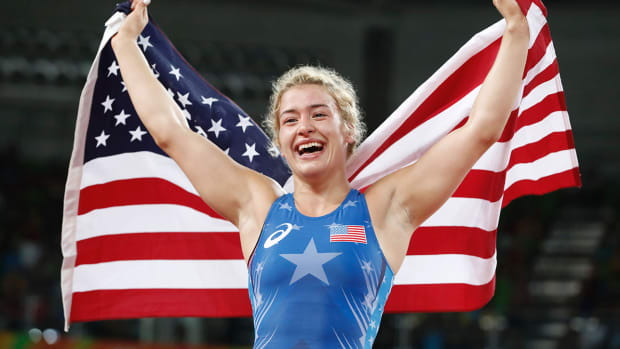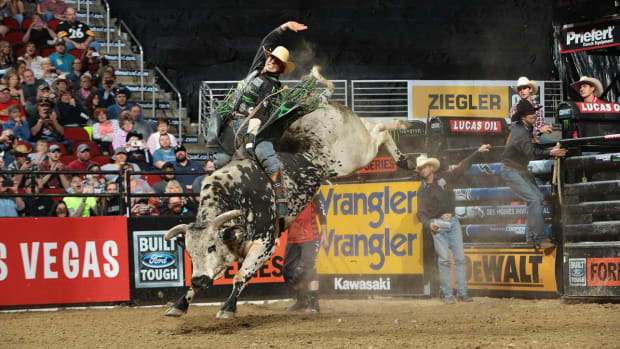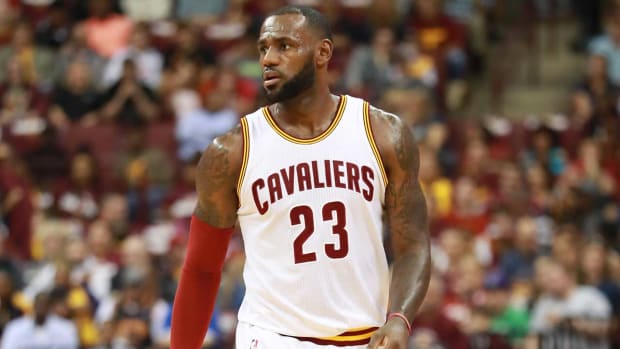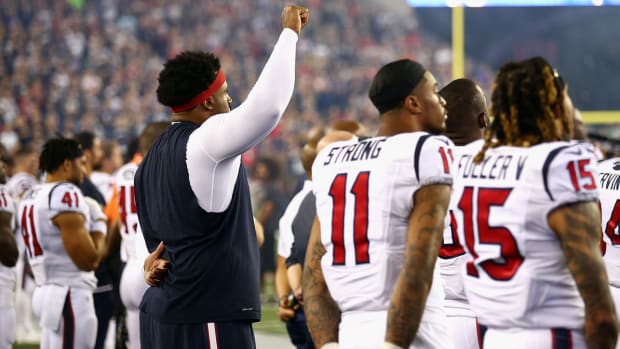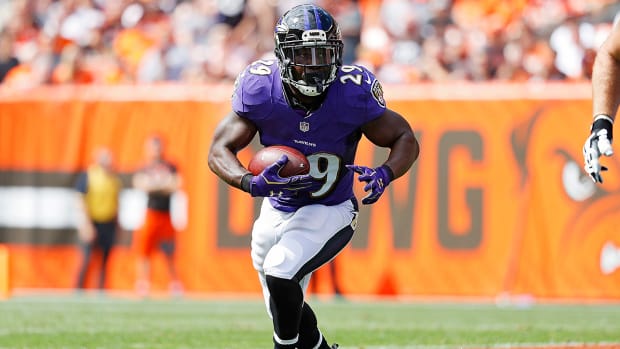The NFL remains addictive in America, but it's losing ground internationally
"S--- is weak, but s--- is weak all over. The thing is, no matter what we call heroin, it's gonna get sold. S--- is strong, we're gonna sell it. S--- is weak, we're gonna sell twice as much. You know why? Because a fiend, he's gonna chase that s--- no matter what." — Stringer Bell in HBO's The Wire
At this point, it is unfathomable to imagine football doing a worse job of protecting and advancing its brand. Last season’s domestic violence scandals exposed the NFL as publicly tone deaf and privately bankrupt in the most basic ethical ways. The subsequent off-season included even more incidents of domestic violence, even more player misconduct, and even less evidence of institutional integrity.
As if the specter of brain injuries and suicides weren't enough of a stain for the league to scrub, the recent Outside The Lines expose on Spygate and Deflategate painted NFL executives and coaches as inept Nixonian villains of the pettiest and goofiest stripe. The image of Roger Goodell overestimating the reach of his authority in the wake of his minions physically stomping video evidence of the Patriots’ cheating conjures a sort of Keystone Cops-meets-Christopher Guest universe, in which incompetence and corruption are so farcical and cartoonish that they become impossible to process within the normal parameters of human experience. Professional football and the people who make it run have entered that rare and frightening air of being parody-proof.
Yet, in the world of the NFL, there is always more bad news. Almost a year to the day of the TIME cover story about the perilous nature of the sport and its sustainability, another high school player died from an injury incurred during a punt return. The day before that, a junior varsity running back was paralyzed by a helmet-to-helmet collision during a high school game in Texas. Not even a week later, a former NFL player died suddenly and inexplicably at age 27, and a former teammate alluded to possible “mental instability.” Football players, both on the professionaland college level, have been shot. Seemingly half of the San Francisco 49ers retired in their primes due to injuries or their desire to avoid permanent physical and mental damage. Chris Borland walked away from a huge sum of money at age 24 because he found the game to be unsafe and dehumanizing.
Keeping in step with that theme, the first Sunday of the new season left Carolina Panthers star linebacker Luke Keuchly dealing with major head trauma, and New York Jets special teamerLorenzo Mauldin facing possible paralysis. This all on the heels of the release of a Hollywood trailer for Concussion, in which Will Smith implores the league, in a comically off-key Nigerian accent, to “tell the truth.” Of course, the NFL—Roger Goodell’s and Bill Belichick’s NFL—doesn’t traffic in truth. In a sport where players are advised to keep their heads on a perpetual swivel, those running the league have their own heads planted firmly in the figurative sand.
It’s not hyberbolic to call both the sport and our dedication to consuming it maudlin and unconscionable. And probably it’s more predictable than surprising that in the wake of all this danger, mismanagement, criminality, and brand-sabotage, the Thursday night season opener between the New England Patriots and Pittsburgh Steelers—as plodding and sloppy an affair as it was—still came a hair away from setting a ratings record. The NFL can’t fail, in spite of itself, and we are the reason. Ours is a culture so desensitized to violence and dysfunction, so desperate for spectacle and vicarious experience of hyper-masculinity and combat, that football succeeds precisely because it fails; it’s America’s ultimate reality show, and the missteps of those who play and oversee the game appeal to our sense of Schadenfreude. Football has carved out a spot alongside porn, alcohol, and sugar as commodities that seem to have a never-ending public demand.
Banking on American sensibilities, though, is what makes the sport of football so limited in its reach, and what will help bring about the sport’s slow but inevitable descent into irrelevance. Even with several aspects of the NFL—all of which are interconnected—under very public scrutiny, those who manage and profit from the league feel little motivation to change. After all, the money still is pouring in. But financial success has lulled the NFL into a sense of complacency and arrogance, which is exactly the sort of thing that sinks ventures that seem unsinkable. Goodell and Co. have become so drunk off their massive influence (such as unprecedented influence on how media report on them) they completely abandoned the notions of vision and practical wisdom that would allow for short term setbacks and concessions in order to ensure the long term sustainability of their product. Football’s popularity and profitability won’t decline this season, nor next, nor will it five years from now. But the negative momentum is building, and without addressing that momentum keenly, there will be significant repercussions sooner than most think.
As the bad karma kept pouring in for the NFL this month, a YouTube video popped up on Sept. 2that would strike most fans as insignificant, but serves as a marker of sorts. Streetballer and basketball trainer Devin Williams attracted massive crowds of young basketball fans to a series of exhibitions in China.
While Williams is many things—entertaining, an electric ball-handler and —he isn’t even a low-level professional basketball player. The demand for basketball is so great in China that even the hint of our American brand of the sport draws an impressive and enthusiastic audience.
Whereas the NFL appeals to and thrives off base American cultural tendencies, the NBA benefits from what we hold as the best of American aims and ideals: the shrewdness to anticipate market trends and the protean ability to shift in accordance with changes in demographics. Hence, the NBA has made substantial investments in China, India, and Brazil, among other countries, and the yield in both interest and talent has been immediate. In some countries, like Brazil, the NBA has full oversight of their league’s marketing and merchandising. In India, basketball in the fastest growing sport after soccer. An estimated 100 million Chinese fans watch the NBA, while 300 million youths play the sport of basketball. That stands in stark contrast with American football, which lands outside of the 15 most popular sports in China, lagging behind games like badminton.
American players play with international teammates in a host of foreign leagues, even in Iraq. In the midst of genocide and crisis, the game of basketball brought people together in Syria. Future NBA talent was on display at the FIBAU19 games this summer in Heraklion, Greece, while a plethora of current NBA talent dominated the FIBA Americas tournament in Mexico City this month.
The world—especially our slice of it—is evolving as it grows more interconnected. Traditional models and formulas are becoming antiquated at an increasing pace, and no commodity is immune to losing to trouble loses even half a step in the market. As close to America’s cultural heart as football is, its inability to expand beyond the narrow confines of our borders and our sensibilities will leave it ripe for eventual collapse. Its warriors are walking away at a greater rate, and parents are becoming more adamant about disallowing their children from playing in youth leagues. It won’t be the lack of fan interest that kills football, but the shallowness of the pool of potential players.
It was former Saints defensive coordinator Gregg Williams who infamously screamed “kill the head, and the body will die!” He didn’t have in mind Luke Keuchly, Josh McCown, Lorenzo Mauldin, Tyler Sash, Chad Stover, Tyrell Cameron, Jasiel Favors, or any of the other casualties of his brutal and morally compromised sport, but his words will prove unintentionally symbolic and prophetic. You can only step on a product so many times before the public realizes there's no high left to get from it. And while American teenagers continue to die on the field, and former players die young off it, teens all around the globe are euphorically embracing basketball not only as a game but as a culture.


